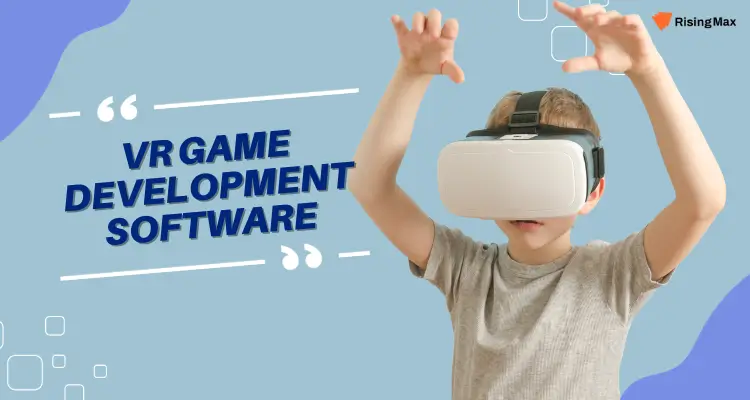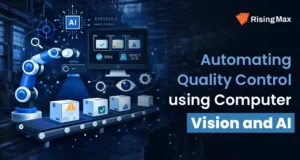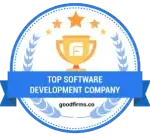Welcome to RisingMax Inc., a pioneering force in the realm of VR game engine development. We are at the forefront of crafting immersive worlds and interactive experiences that redefine the gaming landscape.

Our expertise extends far beyond entertainment, with applications in diverse industries such as education, healthcare, real estate, and more. RisingMax Inc. leverages cutting-edge technology, a talented team of developers, and a deep understanding of user engagement to create VR game engines that not only entertain but also educate and innovate.
Join us on a journey to harness the power of virtual reality and discover new horizons in your industry.
An Introduction To VR Game Development Software
Virtual Reality (VR) has evolved from a niche technology into a mainstream entertainment and educational platform, offering immersive experiences that blur the lines between the digital and physical worlds. At the heart of this transformation lies VR game development software, the creative engine driving the vibrant VR gaming industry.
These software tools empower developers to craft immersive, three-dimensional worlds where players can interact, explore, and be transported to fantastical realms. With a focus on realism and interactivity, VR game design software has become an essential component for both established game studios and developers seeking to harness the unique potential of VR. It delves into the key aspects of VR game development software, exploring its role in shaping the future of gaming, training, and beyond while highlighting the tools and technologies that make it all possible.
Ready to elevate your gaming business?
Try our cutting-edge VR game engine software developers today and immerse yourself in a new world of possibilities.
Why Choose VR Game Engine To Build Gaming Business?
Virtual Reality (VR) game engine software offers several compelling advantages for game development. It enables developers to create immersive, interactive experiences that transport players to entirely new worlds. VR engines provide tools for 3D modeling, physics, and spatial audio, streamlining the development process. They also support a wide range of VR hardware, making it accessible to a broad audience. Additionally, the sense of presence and engagement in VR games is unparalleled, offering unique storytelling opportunities. Overall, choosing a VR game engine software allows developers to tap into cutting-edge technology and deliver innovative, captivating gaming experiences.
What Stats Say About VR Software
- The projected global VR software market revenue for 2023 is US$3.5 billion.
- Anticipated annual growth between 2023 and 2027 is 13.12%, leading to a market volume of US$5.7 billion by 2027.
- The United States is the leading market in terms of revenue, with an expected market volume of US$831.6 million in 2023.
- The VR software market is set to reach 202.3 million users by 2027.
- User penetration rate is expected to rise from 2.3% in 2023 to 3.1% by 2027.
- The estimated average revenue per user (ARPU) is US$23.3.
Use Cases Of VR Gaming Software
VR gaming software offers several features that can greatly benefit businesses in various ways:
Immersive Training Simulations
Businesses can use VR gaming software to create realistic training simulations, enhancing employee skills and knowledge in a safe and engaging environment. This is particularly valuable in industries like healthcare, aviation, and education.
Interactive Product Showcases
VR allows businesses to showcase their products or services in an immersive and interactive manner. This can be a powerful marketing tool, enabling potential customers to experience products before making a purchase.
Virtual Conferencing and Collaboration
VR gaming software can facilitate virtual meetings and collaborations. Team members can meet in a shared virtual space, improving communication and productivity, especially for remote teams.
Customer Engagement and Marketing
VR experiences can be used for marketing campaigns and customer engagement. Businesses can create branded VR games or experiences to connect with customers on a deeper level.
Data Visualization
Complex data can be visualized in three dimensions in VR, making it easier to understand and analyze. This is valuable in fields like data analytics, architecture, and urban planning.
Recruitment and Onboarding
VR can be used in the recruitment process to showcase the workplace environment and for onboarding new employees, providing an immersive introduction to company culture and policies.
Customer Support and Service Training
Businesses can use VR for customer support and training employees in customer service, allowing them to practice and refine their skills in a virtual environment.
Market Research and Consumer Insights
VR can be used to conduct market research and gather insights into consumer behavior by simulating real-world scenarios and gathering data on how users interact with products or services.
Entertainment and Team Building
Utilizing VR for entertainment and team-building activities can improve employee morale and foster a sense of community within the organization.
Competitive Advantage
Early adoption of VR gaming software can give businesses a competitive edge, as it allows them to explore innovative ways to engage with customers, train employees, and deliver unique experiences.
These features demonstrate the diverse range of applications that VR gaming software offers to businesses, helping them to enhance operations, improve customer engagement, and stay ahead in their respective industries.
Top 6 Software Used for VR Game Development
VR game development often relies on software tools like Unity3D, Unreal Engine, and Godot Engine. These platforms offer robust features for creating immersive 3D worlds, handling virtual reality interactions, and optimizing performance, making them preferred choices for VR game developers.
Godot Engine
Godot is an open-source, user-friendly game engine that has gained popularity in recent years. It’s known for its flexibility and ease of use, making it a great choice for indie game developers. Godot supports 2D and 3D game development and includes a built-in scripting language for game logic.
Features
- Free and Open Source: Godot is a completely open-source engine with no licensing fees.
- Cross-Platform: It supports multiple platforms, including Windows, macOS, Linux, Android, iOS, and more.
- Visual Scripting: Offers a user-friendly visual scripting system in addition to traditional programming.
- 2D and 3D Capabilities: Suitable for both 2D and 3D game development.
- Physics Engine: Built-in physics engine for realistic game physics.
- Animation Tools: Provides animation support with a variety of animation blending options.
Unreal Engine
Unreal Engine is a powerful and popular game engine developed by Epic Games. It’s widely used for creating high-quality 3D games and interactive experiences. Unreal Engine provides a range of tools for game development, including advanced graphics, physics, and scripting capabilities. It’s known for its stunning visuals and is often used in the development of AAA games and simulations.
Features
- High-Quality Graphics: Unreal Engine is renowned for its stunning, photorealistic graphics and advanced rendering capabilities.
- Real-time 3D: It offers real-time 3D design, allowing developers to create immersive environments.
- Blueprints Visual Scripting: Streamlines game development through a node-based visual scripting system.
- Cross-Platform: Supports multiple platforms, including PC, consoles, mobile, and VR.
- Physics and Simulation: Provides robust physics and simulation tools for realistic interactions.
Unity
Unity 3D is a versatile and widely adopted game engine used for both 2D and 3D game development. It’s known for its accessibility, cross-platform support, and a vast asset store for game developers. Unity is used in a wide range of applications, from mobile games to virtual reality experiences.
Features
- Cross-platform development: Unity supports multiple platforms, including PC, mobile, console, VR/AR, and web.
- Visual editor: A user-friendly interface for designing games with a drag-and-drop approach.
- Scripting languages: Supports C# and JavaScript for game logic and interactivity.
- Asset store: A marketplace to access a wide range of 3D models, textures, and assets.
- 2D and 3D capabilities: Versatility to create both 2D and 3D games.
- Animation tools: Create animations and control characters and objects.
CryEngine
CryEngine is a game engine developed by Crytek. It’s known for its advanced rendering and physics capabilities, making it a popular choice for creating visually impressive games. CryEngine has been used in various games, particularly known for the Crysis series.
Features
- Cutting-Edge Graphics: CryEngine is renowned for its stunning, photorealistic visuals and advanced rendering capabilities.
- Sandbox Editor: A powerful, user-friendly tool for world and level design, making it easier for developers to create game environments.
- VR Support: CryEngine supports VR integration, allowing developers to create immersive VR experiences.
- Cross-Platform Development: It enables game development for various platforms, including PC, consoles, and mobile devices.
- AI System: CryEngine includes an AI system to create intelligent and responsive in-game characters and entities.
3ds Max
Autodesk 3ds Max is a 3D modeling and animation software widely used in the fields of architecture, film, and video game development. It allows artists and designers to create 3D models, animations, and visual effects, making it an essential tool for 3D content creation.
Features
- High-Quality Rendering: It provides rendering options to produce realistic visuals for games.
- Animation Tools: Advanced animation capabilities for character and object animations.
- Asset Import/Export: Supports various file formats for seamless asset import and export.
- Scene Assembly: Tools for scene organization and management, essential for large game projects.
- Character Rigging: Tools for character rigging and skinning for lifelike animations.
- Physics Simulation: Integration with physics engines to create realistic in-game physics.
Blender
Blender is a free and open-source 3D content creation suite. It includes tools for 3D modeling, sculpting, texturing, animation, rendering, and more. Blender is widely used by artists, animators, and even game developers due to its powerful feature set and cost-effectiveness.
Features
- Real-time 3D game development
- Physics simulation using Bullet physics engine
- Logic editor for creating game logic and interactivity
- Support for Python scripting
- Asset creation and editing within Blender
These tools and engines play crucial roles in game development, 3D modeling, animation, and interactive content creation, catering to a wide range of industries and artistic endeavors.
Unlock the potential of virtual reality in your business. Partner with us to develop customized VR applications, training simulations, or engaging marketing experiences!
Industry That Can Get Benefit By VR Game App Development
These industries are just the tip of the iceberg. VR game development is continually evolving and finding new applications, making it a versatile and transformative technology across various sectors.
Gaming Industry
This is the most obvious beneficiary. VR game development brings immersive experiences, enabling gamers to step into the virtual worlds of their favorite games. The enhanced immersion and interactivity offer new dimensions to gameplay.
Education and Training
VR games provide interactive learning experiences. In fields like medical training, aviation, and military, VR games help professionals practice in realistic environments, enhancing their skills and decision-making.
Healthcare
VR games are used for physical and psychological therapy. They can help patients in pain management and rehabilitation or even treat conditions like PTSD by creating immersive, therapeutic environments. VR in healthcare can provide therapeutic benefits for individuals dealing with mental health issues. It’s used in exposure therapy, anxiety reduction, and stress management.
Real Estate
Virtual tours using VR can give potential buyers a true sense of property. This has applications in both residential and commercial real estate with VR.
Tourism
VR games and experiences allow travelers to explore destinations before their trips. It can also bring historical sites and landmarks to life through virtual tourism.
Automotive
Automotive designers and engineers can use VR game development to simulate vehicle designs and test them in different environments before production.
Marketing and Advertising
VR games and experiences can be used to create immersive marketing campaigns, increasing consumer engagement and brand recognition.
Entertainment and Events
VR game development can be used to create virtual concerts, sports events, and entertainment experiences, especially in situations where physical attendance is limited.
Manufacturing and Industrial Training
VR game development can simulate complex industrial scenarios for training purposes, ensuring worker safety and improving efficiency.
Benefits Of VR Game Engine Software
VR game making software revolutionizes the gaming industry by offering unparalleled immersion, realistic visuals, and interactive experiences while also opening doors to new markets and possibilities.
| Immersive Gameplay | VR game design software offers players a deeply immersive experience where they can interact with the virtual world, enhancing the gaming experience. |
| Realistic Graphics | These engines provide tools for creating lifelike graphics, allowing developers to craft visually stunning virtual environments. |
| Spatial Audio | VR game engines support spatial audio, making the in-game sounds come from their virtual sources, enhancing the sense of presence. |
| Interactivity | They enable developers to create highly interactive games where players can manipulate objects and environments in ways not possible in traditional gaming. |
| Multi Platform Compatibility | Many VR game engines support multiple VR headsets and platforms, making it easier for developers to reach a broader audience. |
| Efficient Development | These engines often come with built-in tools for rapid prototyping and development, saving time and resources. |
| Real-time Feedback | VR game engines provide real-time feedback during development, allowing developers to see the game from the player’s perspective, facilitating quicker iterations. |
| Cross-Device Compatibility | Some VR game engines offer cross-device compatibility, making it possible to develop a game for various VR platforms with minimal adjustments. |
| Expanding Markets | VR game making software contributes to the growth of the VR market, which offers opportunities for developers to create innovative and engaging content. |
Business Benefits Of VR Game Making Software Development
VR game design software development businesses can reap several advantages, including:
| Growing Market | The demand for VR gaming experiences is on the rise, offering businesses a chance to tap into a burgeoning market. |
| Innovation | Developing VR game engines pushes businesses to stay at the cutting edge of technology, fostering innovation. |
| Diversification | VR game engines can be adapted for non-gaming applications, broadening the business’s client base. |
| Revenue Streams | Besides selling game engines, businesses can generate revenue through licensing, support, and custom development services. |
| Competitive Edge | A successful VR game engine can give a business a strong competitive advantage in the VR development sector. |
| Talent Attraction | Being involved in VR can attract top talent looking to work on cutting-edge projects. |
In essence, VR game making software development businesses stand to benefit from market growth, technological innovation, and diversified revenue streams.
Tech Stack To Develop VR Game Engine Software
Developing a VR game engine platform requires a robust tech stack to handle the complexity of virtual reality. Here’s a typical tech stack for VR game engine platform development:
| Programming Languages | C++: Often used for core engine development due to its performance and control. C# or JavaScript: For scripting and game logic in the engine. |
| Graphics and Rendering | OpenGL or DirectX: For low-level graphics rendering. Vulkan: A modern graphics API suitable for VR rendering. |
| Physics Engine | PhysX or Bullet: For handling physics simulations in the virtual world. |
| 3D Modeling and Animation | Blender or Autodesk Maya: For 3D modeling and animation. FBX or Collada: File formats for importing 3D assets into the engine. |
| Sound and Audio | OpenAL or FMOD: For spatial audio in VR environments. |
| VR Headset Integration | SteamVR or Oculus SDK: To integrate with popular VR hardware. |
| Cross-Platform Development | Unity3D or Unreal Engine: These engines offer VR support and cross-platform development. |
| Networking | Photon or UNet: For multiplayer functionality and networking. |
| Scripting and Game Logic | C# or JavaScript: For developing game logic and interactivity. |
| Version Control | Git: To manage source code and collaborate with a development team. |
| UI/UX Design | Such as Adobe XD or Sketch for creating VR user interfaces. |
| Testing and Debugging | VR Headsets:* Oculus Rift, HTC Vive, or other popular VR devices for testing. VR-specific debugging tools:* Like Oculus Debug Tool or SteamVR Developer Tools. |
| Cloud Services | For multiplayer hosting and storage of user-generated content. |
| Security | To protect user data and ensure the safety of VR experiences. |
| Analytics | To gather user data and improve the VR platform over time. |
| Documentation and Collaboration Tools | Confluence, JIRA, Slack:* For project management, documentation, and team communication. |
Developing a VR game engine platform is a complex endeavor that involves integrating multiple technologies to deliver a seamless and immersive experience for users. This tech stack provides a strong foundation for such development.
Conclusion
RisingMax Inc., a leading VR game engine software development company, is at the forefront of innovation in the virtual reality gaming industry. With a deep commitment to creating immersive, high-quality experiences, RisingMax Inc. leverages a robust tech stack, a talented team of developers, and a keen understanding of market trends. Our dedication to pushing the boundaries of VR technology positions them as a key player in the evolving world of virtual reality, and they continue to contribute to the growth and success of this dynamic industry. With our VR game engine software development, the future is exciting and promising.














